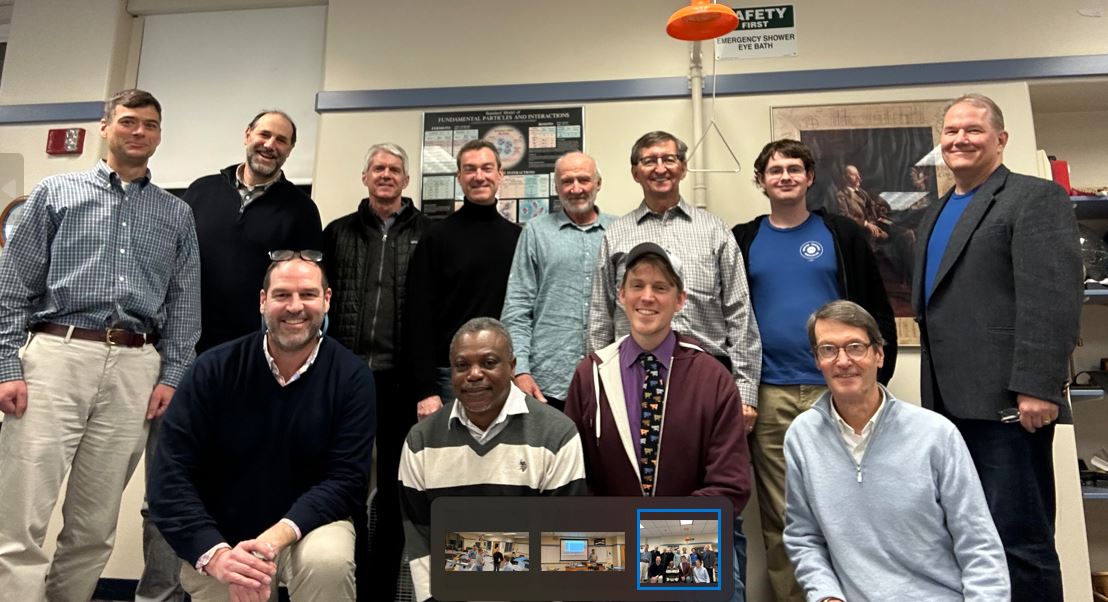Friday Flyer - December 15, 2023

Spotlight on Boston QuarkNet Center
The Boston Center had a busy 2023 right up to this week.
The teachers and selected students went to Northeastern University for their CMS masterclass, a highlight of which was a look at the lab of Prof. Tsuguo Aramaki, who is working to search for dark matter using a time-projection chamber on a high-altitude balloon.
The Boston Center usually has 2-3 meetings during the academic year, so in June the teachers got together at Roxbury Latin School to learn about supermassive black holes and welcome two new teachers. Then summer came and, with it, the Summer Workshop in August, where the group did what may have turned out to be the best-ever New Questions in Particle Physics Workshop. Not only had all the bugs been worked out by the end of summer but, as it turned out, the g-2 experiment made its big announcement on one of the hottest "new questions" there is, right on the second day of the workshop. A workshop does not get too much more exciting than that.
As hinted above, the group was back at Roxbury Latin this past Tuesday, learning the ins and outs of relativity. Judging from the smiles in the image below, it was a great time.


News from QuarkNet Central
Registration for International Masterclasses (IMC) 2024 continues. Registration forms have closed, and now registration is by email. Fermilab-based masterclass videoconferences - ATLAS, CMS, MINERvA, and NOvA - are found on the Fermilab schedule page. The process is simple: go the the videoconference schedule page, find an open slot that works for your group, and alert Ken or Shane. For CERN and other videoconference centers, find the appropriate schedule in the IMC website. Want to know more? Please read the latest IMC Circular.
CERN Summer Programs 2024: check your inbox next week for the QuarkNet application to participate in the CERN High School Teachers (HST) program in July or International Teacher Weeks (ITW) in August.
Perimeter Institute just sent out an email with lots of opportunities for teachers? Didn't get it? Check the PDF.
Mostly for mentors and/or lead teachers: If you have not done so already, please submit your Annual Reports and invoices for the fiscal year that ended on August 31. Sooner is better! Not sure what to do? Check out these instructions or ask the staff!
Reminder: Periodically check the QuarkNet Calendar for what's coming up in QuarkNet. When logged in, go to COMMUNITY > EVENTS to find this calendar. As we improve the calendar, you will see more information about, not only coming events, but applications, due dates, etc.
Another reminder: The Kavli Institute for Theoretical Physics (KITP) will be hosting their 2024 Teachers' Conference in Santa Barbara, CA, on Saturday, April 7, 2024. This year's topic is "Supermassive Black Holes and their Destructive Tidal Forces." Registration is now open. Note that KITP has financial aid for travel and lodging that is awarded on a rolling basis.

Physics Experiment Roundup
CERN Bulletin has some interesting news for us. ALICE reports an incredible number of heavy ion collisions in the most recent run. And LHC is gearing up for even higher luminosity with a successful pre-production magnet test for the High Luminosity LHC. We can also learn more about quarks thanks to measurements of an exotic atomic nucleus and take a look back on an eventful year for accelerators.
Physics Magazine has news with an astrophysical edge. First, measurements by the Hyper Suprime-Cam Subaru Strategic Program weak-lensing survey show a deviation from cosmological theory. And it looks like warm Jupiter-like exoplanets may have massive cyclones.
We have one last item to round up from our own Notre Dame QuarkNet teacher and LHC fellow Jeremy Wegner. Jeremy is working on a master's in mathematics and his final project for his linear algebra class was analysis of atmospheric pressure vs. cosmic ray flux data that he took with his students. Check out his narrated presentation (Note: You have to advance the slides manually.)

Resources
Last issue, Symmetry gave us a look at the electroweak interaction. This time around, they explain why it is so hard to measure the strong interaction. APS Physics takes us deeper into the weeds of theory by asking about symmetry-violating decays of bottom-containing baryons and the true and false of quantum gravity.
Fermilab News sheds light on the future of particle physics with news of a new international agreement on DUNE and (drumroll, please), the release of recommendations for particle physics priorities by the High Energy Physics Advisory Panel. Here is a nice explanation of the report by CBS News Chicago.
Are neutrinos bad friends? Ask Kirstie Duffy in Even Bananas.
Just for Fun
Time, before we take a break until 2024, for some holiday videos. Check out Spock as Grinch, A Darmok Christmas, and, if you dare, the original Star Wars Holiday Special.
Next, xkcd on snow, the scale of the solar system, airliners, and x (not formerly Twitter).
Finally, let NASA tell us about Celebrating the Holidays in Space.
QuarkNet Staff
Mark Adams: adams@fnal.gov
Ken Cecire: kcecire@nd.edu
Spencer Pasero: spasero@fnal.gov
Shane Wood: swood5@nd.edu
